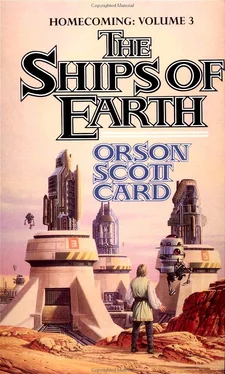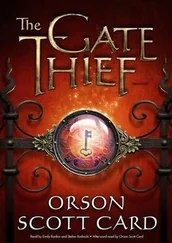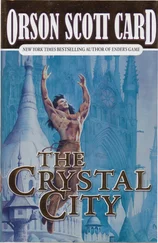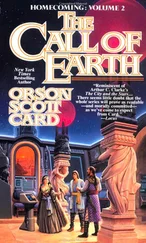Orson Card - THE SHIPS OF EARTH
Здесь есть возможность читать онлайн «Orson Card - THE SHIPS OF EARTH» весь текст электронной книги совершенно бесплатно (целиком полную версию без сокращений). В некоторых случаях можно слушать аудио, скачать через торрент в формате fb2 и присутствует краткое содержание. Жанр: Фантастика и фэнтези, на английском языке. Описание произведения, (предисловие) а так же отзывы посетителей доступны на портале библиотеки ЛибКат.
- Название:THE SHIPS OF EARTH
- Автор:
- Жанр:
- Год:неизвестен
- ISBN:нет данных
- Рейтинг книги:4 / 5. Голосов: 1
-
Избранное:Добавить в избранное
- Отзывы:
-
Ваша оценка:
- 80
- 1
- 2
- 3
- 4
- 5
THE SHIPS OF EARTH: краткое содержание, описание и аннотация
Предлагаем к чтению аннотацию, описание, краткое содержание или предисловие (зависит от того, что написал сам автор книги «THE SHIPS OF EARTH»). Если вы не нашли необходимую информацию о книге — напишите в комментариях, мы постараемся отыскать её.
THE SHIPS OF EARTH — читать онлайн бесплатно полную книгу (весь текст) целиком
Ниже представлен текст книги, разбитый по страницам. Система сохранения места последней прочитанной страницы, позволяет с удобством читать онлайн бесплатно книгу «THE SHIPS OF EARTH», без необходимости каждый раз заново искать на чём Вы остановились. Поставьте закладку, и сможете в любой момент перейти на страницу, на которой закончили чтение.
Интервал:
Закладка:
A typical moment—Xodhya got hit in the arm by Motya's careless swinging of his loaded sling. His eyes immediately filled with tears, and Proya taunted him. "You'll never be a man, Xodhya! You'll always just be coming near!" That was a play on his name, of course, and a rather clever one—but also cruel, and it did nothing but add to Xodhya's misery. Then, without any of the boys being particularly aware of it, Xodhya turned in his misery to Zhyat, who offhandedly threw his arm around Xodhya's shoulder as he barked at his little brother Motya, "Be careful with your sling, monkey brains!"
It was a simple, instinctive thing, but Luet and Nafai smiled at each other when they saw it. Not only did Zhatva offer physical comfort to Xodhya, without a hint of condescension, but also he drew attention away from Xodhya's pain and incipient tears and threw the blame where it rightly belonged, on Motya's carelessness. It was done easily and gracefully, without giving the slightest challenge to Proya's authority among the boys.
"When will Zhyat see that he's the one the other boys turn to when they're in trouble?" asked Nafai.
"Maybe he fills that role so well because he doesn't know that he's filling it."
"I envy him," said Nafai. "If only I could have done that."
"Oh? And why couldn't you?"
"You know me, Luet. I would have been yelling at Protchnu that it wasn't fair for him to tease Xodhya because it was Motya's fault and if it had happened to Protchnu he'd be crying too."
"All true, of course."
"All true, but it would have made Protchnu my enemy," said Nafai. He hardly needed to point out the consequence of that. Hadn't Luet lived through it with him often enough?
"All that matters to me is that our Zhatva has the love of the other boys, and he deserves it," said Luet.
"If only Motya could learn from him."
"Motya's still a baby," said Luet, "and we don't know what he'll be except that it'll be something loud and noticeable and underfoot. The one that I wish could learn from Zhatva is Chveya."
"Yes, well, each child is different," said Nafai. He turned and led Luet away from the stone-slinging and on toward Father and Mother's house. But he well understood Luet's wish: Chveya's loneliness and isolation from the other children was such a worry to them both—she was the only complete misfit among all the older children, and they didn't understand why, because she did nothing to antagonize the others, really. She simply didn't have a place in their childish hierarchies. Or perhaps she had one, but refused to take it. How ironic, thought Nafai—we worry because Zhatva fits in too well in a subservient role, and then we worry because Chveya refuses to accept a subservient role. Maybe what we really want is for our children to be the dominant ones! Maybe I'm trying to see my own ambitions fulfilled in them, and that would be wrong, so I should be content with what they are.
Luet must have been thinking along the same lines, because she said, out of the silence between them, "They're both finding their own paths through the thickets of human society, and well enough. All we can really do is observe and comfort and, now and then, give a hint."
Or turn bossy little Queen Dza upside down and shake her until her arrogance falls out. But no, that would only cause a quarrel between families—and the last family that they would ever quarrel with would be Shuya's and Issya's.
Volemak and Rasa listened with interest to their tale of Chveya's dream. "I've wondered, from time to time, when the Oversoul would act again," said Father, "but I'll confess that I haven't been asking, because it's been so good here that I didn't want to do anything to hasten our departure."
"Not that anything we might do could hasten our departure," said Mother. "After all, the Oversoul has her own schedule to keep, and it has little to do with us. She never cared whether we spent these years at that first miserable desert valley, or that much better place between the North and South rivers, or here, which is quite possibly the most perfect spot on Harmony. All she cared about was getting us together and ready for when she needs us. For all we know, it's the children she plans to take on the voyage to Earth, and not us at all. And that would suit me well enough, though I'd really prefer it if she took the great-grandchildren, long after we're all dead, so we'll never have to see them go and break our hearts missing the voyagers."
"It's how we all feel sometimes," said Luet.
Nafai held his tongue.
It didn't matter. Father saw right through him. "All but Nafai. He's ready for a change. You're a cripple, Nyef. You can't stand happiness for very long—it's conflict and uncertainty that bring you to life."
"I don't like conflict, Father," protested Nafai.
"You may not like it, but you thrive on it," said Volemak. "It's not an insult, son, it's just a fact."
"The question is," said Rasa, "do we do anything because of Chveya's dream?"
"No," said Luet hastily. "Not a thing. We just wanted you to know."
"Still," said Father, "what if some of the other children are having dreams from the Keeper but haven't told anybody about them? Perhaps we should alert all the parents to listen to their children's dream tales."
"Put the word out like that," said Rasa, "and you know that Kokor and Dol will start coaching their daughters on what dreams they ought to have, and get nasty with them if they don't come up with good giant rat dreams."
They all laughed, but they knew it was true.
"So we'll do nothing for now," said Father. "Just wait and see. The Oversoul will act when it's time for him to act, and till then we'll work hard when there's work to be done, and in the meantime try to raise perfect children who never quarrel."
"Oh, is that the standard of success?" asked Luet, teasingly. "The ones who never quarrel are the good ones?"
Rasa laughed wryly. "If that's the case, the only good children are the ones who have no spine at all."
"Which means no descendent of yours, my love," said Father.
The visit ended; they returned home and went on with the day's work. But Nafai was not content to wait and see. It troubled him that there had been so few visions, and that now the only one to receive anything from the Keeper was Chveya, and her the loneliest child, and too young to make real sense of her own dream.
Why was the Oversoul delaying so long? It had been in quite a hurry to get them out of Basilica nine years ago. They had given up everything they had ever expected their lives to bring them, and plunged into the desert. Yes, things had turned out rather well in the end, but it wasn't the end, was it? There were more than a hundred light-years ahead of them, the part of their journey they had completed so far was nothing, and there was no sign of resuming it.
Answer me!
But there was no answer.
It took another dream to stir Nafai to action. It was Luet this time; Nafai woke from a sound sleep to find her whimpering, moaning, then crying out. He shook her awake, speaking soothingly to her so she would be calmed as she emerged from her dream. "A nightmare," he said. "You're having a nightmare."
"The Oversoul," she said. "She's lost. She's lost."
"Luet, wake up. You're having a dream."
"I am awake now," she said. "I'm trying to tell you the dream."
"You dreamed about the Oversoul?"
"I saw myself in the dream. Only young—Chveya's age. The way I used to see myself in dreams."
It occurred to Nafai that it hadn't been all that long since Luet was Chveya's age. She had been a child when he met and married her, barely in her teens. So when she saw herself as a child, how different could it be from how she saw herself now? "So you saw yourself as a child," said Nafai.
Читать дальшеИнтервал:
Закладка:
Похожие книги на «THE SHIPS OF EARTH»
Представляем Вашему вниманию похожие книги на «THE SHIPS OF EARTH» списком для выбора. Мы отобрали схожую по названию и смыслу литературу в надежде предоставить читателям больше вариантов отыскать новые, интересные, ещё непрочитанные произведения.
Обсуждение, отзывы о книге «THE SHIPS OF EARTH» и просто собственные мнения читателей. Оставьте ваши комментарии, напишите, что Вы думаете о произведении, его смысле или главных героях. Укажите что конкретно понравилось, а что нет, и почему Вы так считаете.









